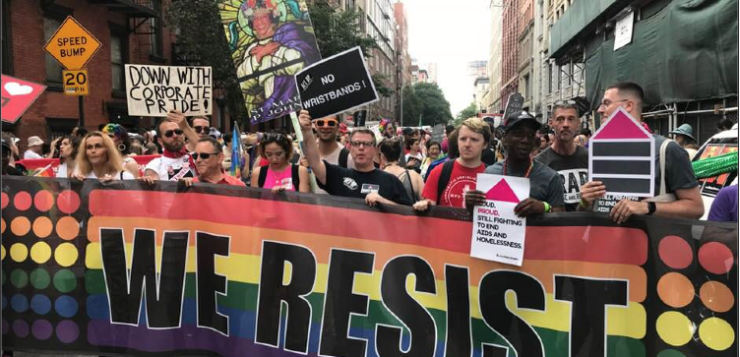IN JUNE 2017, I co-organized an oral history fieldwork trip to document the Equality March for Unity and Pride (EMUP) in Washington, D.C. It was one of many mass demonstrations taking place that year following the inauguration of Donald Trump. EMUP was organized to coincide with D.C.’s Capital Pride, but the two remained distinct events. In finalizing the schedule of events our group would attend over that weekend, I came across No Justice No Pride (NJNP). This grassroots trans- and queer-led organization was hosting a “QT Night of Healing and Resistance” with the Trans Women of Color Collective, another grassroots organization within the District. We met dozens of black trans women and learned about their experiences and used oral history methods to record their stories, which are now archived at the University of Florida.
This was one of the first times I so clearly identified the gaps within our communities and the lgbtq+ movement more generally. Black trans women face intersecting systems of oppression within a structure of white supremacist capitalist hetero-patriarchy. They are routinely marginalized, and so they turn to one another to find and build community.
At the same time, just a few blocks away from this event, thousands of people were celebrating at the annual Capital Pride Parade. People lined the streets to watch the decked-out corporate floats pass by, dancing and singing along to the songs that were blaring from speakers. Later that weekend Capital Pride was also hosting a star-studded concert and festival. This contrast is worthy of note: in one space a grassroots contingent, organized for and by trans women of color to provide room for healing and resistance within the context of the growing number of black trans women being murdered for simply existing; in the other space, thousands of lgbtq+-identifying people and allies celebrating “gay pride.” What does this disconnect between the two groups represent within our community? What is there to celebrate when members of our community continue to face structural oppression? How do we begin to transform the ways in which we build solidarities across difference to reach for liberation?
For the past few years I have conducted participant observations and interviews with trans/queer activist organizations in cities around the country to better understand how they interpret the answers to these questions and participate in building a trans/queer intersectional movement. By tracing the history of pride marches—how they have changed over the years and the work that activists in various cities have done to transform them—it is possible to imagine what an intersectional march would look like.
Robert Baez is a doctoral candidate in sociology at the Univ. of Florida, where he researches sexualities and social movements.







